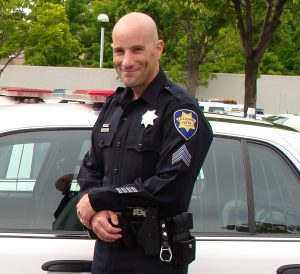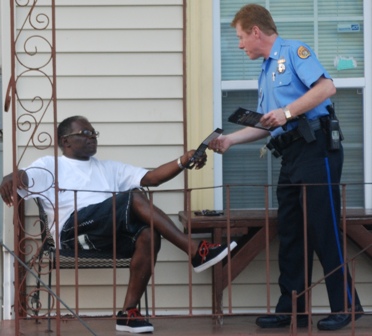This article is part of a series focusing on individuals who dedicate their careers to serving the public in honor of Public Service Recognition Week.

In addition to being a police officer, he’s the owner of Graves & Associates, a law enforcement training company that teaches courses in drug enforcement, drug recognition, community policing, and tactical team leadership. Keith is currently a student at American Military University, pursuing a master’s degree in criminal justice.
We asked Keith why he chose a career in public service and how his work as a police officer helps others.
What inspired you to pursue a career in law enforcement?
My father was a police officer and I grew up seeing the good work that police officers do every day. As a kid, I would go on ride-alongs with my dad and his co-workers. I loved the excitement and the camaraderie of the job.
What do you wish you knew before going into this field?
I wish I’d known how valuable an education was. I resisted going to college after high school because I just wanted to serve in the Army and then become a police officer. I underestimated how valuable a college education is for everyday police work.
I used complex math as a traffic officer and simpler math as a police sniper. I also needed to have a firm grasp of English composition when I wrote arrest reports and search warrants. Education is paramount. I went to college after my kids were born and realized that my past work would have been much easier if I had earned my degree before becoming a cop.
What is the most satisfying and/or enjoyable aspect of your job?
I was lucky enough to get a lot of experience in drug investigations at my agency. As time went by, I went to instructor-level courses and began teaching police officers how to work drug crimes.
Decades later, I am now a national trainer on the subject. I’ve traveled this great nation to interact with and train our best police officers. This love of training gave me a great business that will carry me into retirement.
Is there a moment or an incident that you reflect upon fondly as being highly representative of why you pursued this career in the first place?
Several years ago, crime skyrocketed in one of our federally subsidized housing complexes. In one year, we responded to almost 2,000 calls for service in a 180-unit complex. My partner and I worked with the community, the housing authority and different stakeholders to come up with a plan to reduce crime there.
We found that people who didn’t even live in the complex committed a majority of those crimes. We made some environmental design changes, got restraining orders against some problem suspects, and worked with the community on reporting crime and taking a stand.
It’s been several years now and we now have less than 200 calls for service a year in that area. Working with the community is what it is all about.
What impact does your work have on American citizens?
Police officers are guardians of the Constitution. We are the first responders of government as a whole as well. Some citizens may never have contact with a government official, but they see police officers every day.
We also see people at the worst times of their lives. We must come in, be professional, and help them during that traumatic event. It’s imperative that every officer be the best he or she can be, so that citizens walk away with confidence in their government and their police departments.
What advice would you give others pursuing a similar career?
First and foremost, go to college. Even if you go after becoming a police officer, it is imperative that you are as educated as possible. I received my bachelor’s degree in business and I use it every day on the job.
Now, I’m working on my master’s degree in criminal justice. I have used information from every one of my classes for my job. Someday, you will want to get promoted. You’ll need that education to put yourself above everyone else vying for the same position.
Lastly, I would also tell people interested in becoming police officers to ignore the media reports of the anti-police movement. I am seeing the exact opposite. People stop me in the street daily to express their thanks to me for being a police officer and keeping the country safe. I have found that the public is very supportive of police, even though that is not what the press reports.
To learn more about Keith Graves and his career as a police officer and drug investigator, please read his recent articles:

Comments are closed.